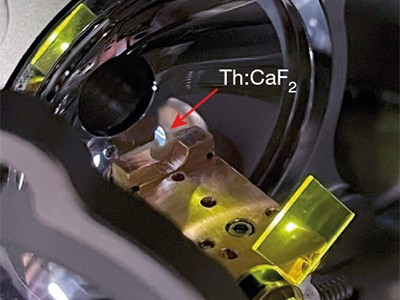Precise timekeeping helps us in our daily lives: from pinpointing your precise location with GPS to synchronising financial deals to the millisecond, and physicists are also seeking ever more accurate measurements of time, as super-accurate clocks could help make planet-sized telescopes, hunt for dark matter or even monitor the shape of the planet from the air.
Read the paper: Frequency ratio of the 229mTh nuclear isomeric transition and the 87Sr atomic clock
So researchers are working on a nuclear clock – a device that would harness the energy levels of the nucleus of an atom to act as a timekeeper.
Now, they’ve got closer than ever, by making extremely accurate measurements of the frequency of light required to push thorium nuclei into a higher energy state – potentially defining the tick of a future nuclear clock.
You Might Also Like
The Nature Podcast highlights of 2025
You have full access to this article via your institution. Download the Nature Podcast 24 December 2025In this episode:00:40 What...
Seeding opportunities for Black atmospheric scientists
Vernon Morris (outlined) with alumni from the atmospheric sciences PhD programme he established at Howard University in Washington DC.Credit: Vernon...
peer reviews created using AI can avoid detection
The difficulty of detecting AI-tool use in peer review is proving problematic.Credit: BrianAJackson/iStock via GettyIt’s almost impossible to know whether...
I’ve earned my PhD — what now?
Illustration: David ParkinsThe problemDear Nature,In December 2024, I finished my PhD in biomedical chemistry in Italy, and I now find...











